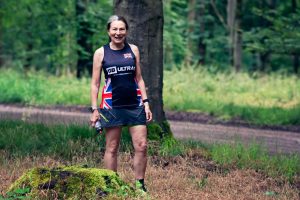Healthy ageing and running Ultras later in life – Ais North
"In terms of training, rip up the rule book, training for an Ultra is not the same as a marathon"
Inspirational Ultrarunner Ais North checked in with Ultrarunner Magazine for a Q & A, detailing her journey with illness and recovery, feminism and Ultras. Born in an area where women were discouraged from running, Ais broke the mould and followed her own path towards the trails!
Ais North…
I’m a woman in my seventies, I have run my own international consulting business for 35 years, I am a mother of two daughters and a grandmother with two grandsons. I am an ultrarunner who now lives in Wiltshire. Born in 1950 I was brought up in Aberdeen in the North-East of Scotland.
I went to a girls’ school where I loved to run, race, and compete against the girls, but I was never encouraged to be a serious athlete. In those days women were actively discouraged from running any further than 800 metres or 880 yards, as it was. Negative myths abounded telling us that if we pushed ourselves to go faster and further we would affect our reproductive system, that running would stop us from having children. It was a little off-putting.
However, Aberdeen is a city by the sea in the country and this allowed me to pursue many sports like skiing, climbing, sailing. Running was just something I did at school. After I left school I joined the Aberdeen athletics club, I always felt I could run further than 800 metres and was lucky enough to encounter some well-known long-distance runners like Don Ritchie who was a member of the same club, and I did run further, encouraged by one of them, and I was allowed to compete in the “Ladies’ Mile” at various Highland Games, but it wasn’t enough, so I stopped running. There was hardly any news in terms of athletics for women and there were no social media platforms, so I didn’t know that women had started running marathons or I would have been right in there.

I stopped running at twenty-two and went to work for an oil company, I put all my energy into my work and became the first woman to work on a North Sea oil platform which satisfied my competitive nature and supported my belief in equal opportunity. I wasn’t a Germaine Greer type of feminist, but I always believed that men and women were equal and should be given similar opportunities.
From the age of twenty-two, I probably ran no further than 5k and I certainly didn’t do any kind of regular training. I would go out and be energetic, skiing in winter and hiking and climbing in summer. In my thirties I had our daughters, so they kept me active, we went cycling, hiking, camping, and windsurfing. I always had plenty of energy and was fit enough so I didn’t think much about running until I was diagnosed with breast cancer when I was 47. In those days we lived in Chiswick in London, and we were right beside the river and the towpath. During my treatment, I started to run about 5k between the bridges on a fairly regular basis. I ran to make myself feel better but once I felt that I had recovered, I gave it up again.
Support the whole team who put all this together
This is premium stuff! Subscribe for ONLY 99p for ALL online content!
Subscribe
Get right to the heart of ultra-running featuring interviews and podcasts with world class athletes, extraordinary race directors, ultra-running coaches, nutritional experts and in depth race reviews from around the globe!Get your access now








